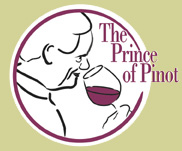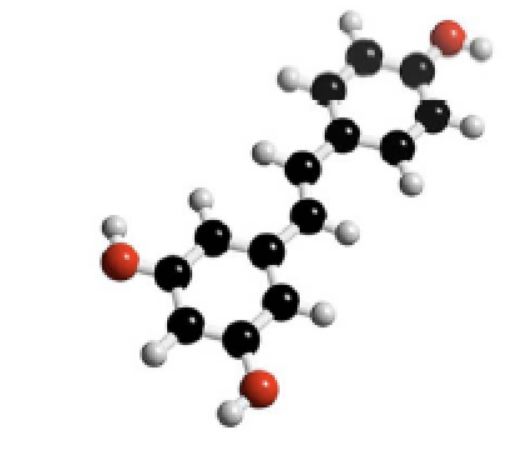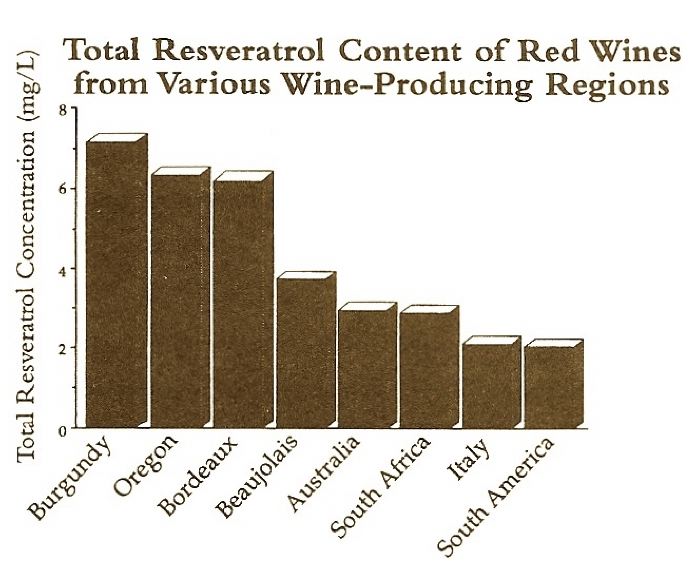Polyphenols in Wine May Add Health Benefits
Most scientific research on the health benefits of wine has focused on the polyphenols that include
resveratrol, quercetin, anthocyanins, procyanidins, ellagic acid and catechins. Cornell scientist Leroy Creasy
first isolated resveratrol from red wines in 1991 and later theorized that resveratrol was at least partly
responsible for red wine’s health benefits. This led to a plethora of research studies. Resveratrol became the
most investigated polyphenol and was termed the “polyphenol most likely to succeed.” Resveratrol has been
shown to slow or inhibit cancer cell growth, lower bad cholesterol (LDL) and raise good cholesterol (HDL),
prevent blood vessel damage, slow progression of Alzheimer’s and help regulate insulin to prevent type 2
diabetes mellitus. Unfortunately, there does not appear to be enough resveratrol in wine to have a significant
effect.
Polyphenols are antioxidants found in the skin of red grapes, red wine, tea, cacao, dark chocolate, peanuts and
blueberries. They are antioxidative because they have a catechol group on the aromatic ring that attracts
oxygen-free radicals.
The human body’s biochemical pathways result in waste products such as free radicals. The free radicals are
considered the body’s terrorists because they attach to a molecule with an unpaired electron, a process called
oxidation. When free radicals interact with DNA in cells or the cell membrane, the cells may function poorly or
die causing diseases of aging such as vascular disease, cancer, dementia and diabetes. Polyphenols are also
anti-inflammatory and can inhibit or prevent tumor growth.
Red wines that are dark in color and high in tannins have higher polyphenol content such as Tannat, Petite
Sirah, Nebbiolo, and Cabernet Sauvignon. Although Pinot Noir is a thin-skinned grape, it has among the
highest levels of polyphenols of all red grapes. the polyphenol content of red wines will vary depending on
where the grape is grown, how the wine is made, and how old the wine is with more polyphenols in younger
wines.
A study in STAT News in September 2018 reported that resveratrol and quercetin, two antioxidants found in red
wine, are being incorporated into heart stents being developed at REQuisite Biomedical to keep blood vessels
from narrowing again after insertion in coronary angioplasty. The new stent releases red wine antioxidants that
work by preventing blood clotting and inflammation. The company is also developing a balloon with the two
antioxidants in red wine coated on it to treat peripheral artery disease.
A Spanish research team reported in the Journal of Agricultural and Food Chemistry in 2018 that polyphenols
in wine can fend off harmful bacteria in the mouth and play a role in fighting tooth decay and gum disease. The
researchers found two polyphenols in red wine, p-coumaric and caffeic acid, that reduced bacteria’s ability to
stick to the gum cells in the mouth when used alone or combined with an oral probiotic.
Swiss scientists have developed a nasal spray containing resveratrol that is administered via an asthma-styled
inhaler. It was shown to decrease by 45 percent the formation of tumors in mice exposed to a cancer-causing
compound from cigarette smoke. This spray may also work in humans as a preventative against lung cancer,
the deadliest form of cancer. The concentration of resveratrol in the lungs after nasal spray administration
was 22 times higher than when taken orally. It is possible that resveratrol may be administered through
electronic cigarette smoking as well as resveratrol is highly soluble in e-cig fluid. This study was published in /
September 2018 in the journal Scientific Reports.
Scientists at Al-Rafidain University College in Baghdad found that patients with osteoarthritis given a
resveratrol compound reported less pain and reduced inflammation in their knees. Published in the Journal of
Medicinal Food in December 2018, orally administered resveratrol as an adjuvant with meloxicam appeared to
be an effective treatment of patients with mild to moderate knee osteoarthritis.
Research reported in BMC Cell Biology in October 2017 revealed that resveratrol analogues applied to cells in
culture rejuvenated the cells quickly. Splicing factors that are turned off as we age can be turned back on in the
compound-soaked cells. It was theorized that using chemicals to switch back on the major class of genes that
are switched off as we age might provide a means to restore function to old cells.




